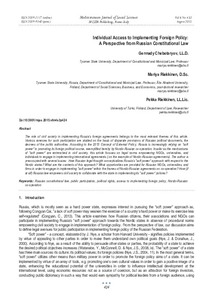Individual Access to Implementing Foreign Policy: A Perspective from Russian Constitutional Law
Mariya Riekkinen; Pekka Riekkinen; Gennady Chebotaryov
https://urn.fi/URN:NBN:fi-fe2021042715110
Tiivistelmä
The role of civil society in implementing Russia's foreign policy is the most relevant theme in this article. Various avenues for such participation are studied on the basis of disparate provisions of Russian political documents and the degrees enacted by public authorities. According to the 2013 official concept of External Policy, Russia is increasingly relying on "soft power" in promoting its foreign political course, exemplified here by the Nordic-Russian cooperation. In so far as these ultimately governmentally defined means are entrenched in the civil society, this article focuses on legal norms empowering NGOs, universities, and individuals to engage in implementing international agreements (on the example of the Nordic-Russian agreements). The authors ask, how the Russian legal thought conceptualizes Russia´s soft power approach with respect to the Nordic states? What are the contents of this approach? What opportunities are provided for the Russian NGOs etc. to engage in implementing "soft power" within the frames of Nordic-Russian agreements on co-operation? How, if at all, Russian law empowers the civil society to collaborate with the state implementing its " soft power" policies in its somewhat Clausewitzian foreign policy doctrine and practice?
Kokoelmat
- Rinnakkaistallenteet [19218]
